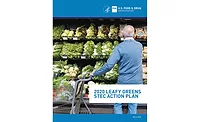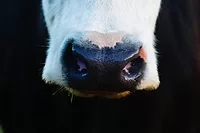Manufacturing News
Bill would allow the FDA access to CAFOs

Sen. Kirsten Gillibrand introduced a bill allowing the FDA to take samples on USDA-regulated large animal farms and feedlots.
Photo courtesy of the U.S. Senate
In an effort to allow FDA to sample water, soil and environmental conditions on USDA-regulated concentrated animal feeding operations (CAFOs), New York Sen. Kirsten E. Gillibrand introduced a bill (S.2958) that would provide the FDA authority to conduct microbial sampling on CAFOs as necessary for a foodborne illness outbreak investigation, determine the outbreak’s root cause or address other public health needs.
Entitled the “Expanded Food Safety Investigation Act of 2019,” S.2958 has one cosponsor, Sen. Richard Blumenthal. The bill has been referred to the Committee on Health, Education, Labor and Pensions.
“CSPI (Center for Science in the Public Interest) welcomes the introduction of the Expanded Food Safety Investigation Act of 2019 by Sen. Kirsten Gillibrand,” says Sarah Sorscher, CSPI deputy director of regulatory affairs. “A companion bill is expected to be introduced in the House by Congresswoman Rosa DeLauro, chair of the Congressional Food Safety Caucus. The bill authorizes the Food and Drug Administration to test for E. coli, salmonella and other pathogens on large animal farms in order to investigate outbreaks of foodborne illness.”
Two recent romaine outbreaks
USDA and FDA jurisdictional issues have shown the need for this bill. Though the E. coli 2019 romaine outbreak—traced back to fields in Salinas, Calif.—has no actual source pinpointed at the time of this writing, a 2018 E. coli romaine outbreak was traced back to an irrigation canal that supplied water to many of the romaine farms in Yuma, Ariz. Unfortunately, this irrigation canal is located adjacent to a CAFO, where there was a strong suspicion that the E. coli had originated. However, because of jurisdictional issues, FDA could not set foot on the CAFO property to take any test samples. This issue was covered in FE’s Manufacturing News article entitled “Crises still drive food safety in U.S.”
According to a final CDC update on the Yuma 2018 multistate outbreak, the FDA and state and local regulatory officials identified the outbreak strain of E. coli O157:H7 found in the canal to be “closely related genetically to the E. coli O157:H7 from ill people.”
A Dec. 19 CDC update says that a total of 138 people were infected with the Salinas 2019 outbreak strain of E. coli O157:H7, involving 25 states and sending 72 people to hospitals. While the investigation is ongoing, the romaine growing season in the Salinas Valley is over with product out of the supply chain, making further tracing difficult.
Unfortunately, the Salinas area—including nearby Monterey County—was the locus of a confirmed E. coli O157:H7 outbreak in 2006 where a San Juan Bautista grower produced contaminated spinach (see FE article, “E. coli outbreak not surprising”) that affected 204 people in 26 states. The FDA checked many sources, while a USDA lab suggested pathogen regrowth in a tertiary irrigation water supply pipeline might be a source. In addition, the FDA had sent a letter to California lettuce growers and packers in 2005, citing 18 E. coli outbreaks since 1995, of which eight tracebacks indicated Salinas.
Looking for quick answers on food safety topics?
Try Ask FSM, our new smart AI search tool.
Ask FSM →
A further look at the details
Key points of S.2958 in regards to CAFOs include:
- The Secretary (of Health and Human Services) may request access to a CAFO to conduct microbial sampling if deemed necessary to facilitate a foodborne illness outbreak investigation.
- Granting of reasonable access—A CAFO that receives a request for access must make that access available to conduct a microbial sampling of plants, animals, water and the environment as needed.
- Authority over foods regulated by the Secretary of Agriculture—Nothing in this section shall be construed to impose additional requirements by the secretary, beyond microbial sampling, with respect to food that is within the jurisdiction of the Secretary of Agriculture pursuant to the Federal Meat Inspection Act, the Poultry Products Inspection Act or the Egg Products Inspection Act.
- Coordination with other public health agencies—The secretary shall ensure that data collected under this section are made available to the Secretary of Agriculture and relevant state and federal public health agencies in order to facilitate work in detecting, investigating or preventing foodborne illness.
If approved, the bill will add the above requirements to Chapter IV of the federal Food, Drug and Cosmetic Act (21 U.S.C. 341 et seq.).
To read the proposed bill in its entirety, go to https://www.congress.gov/bill/116th-congress/senate-bill/2958/text.









